



























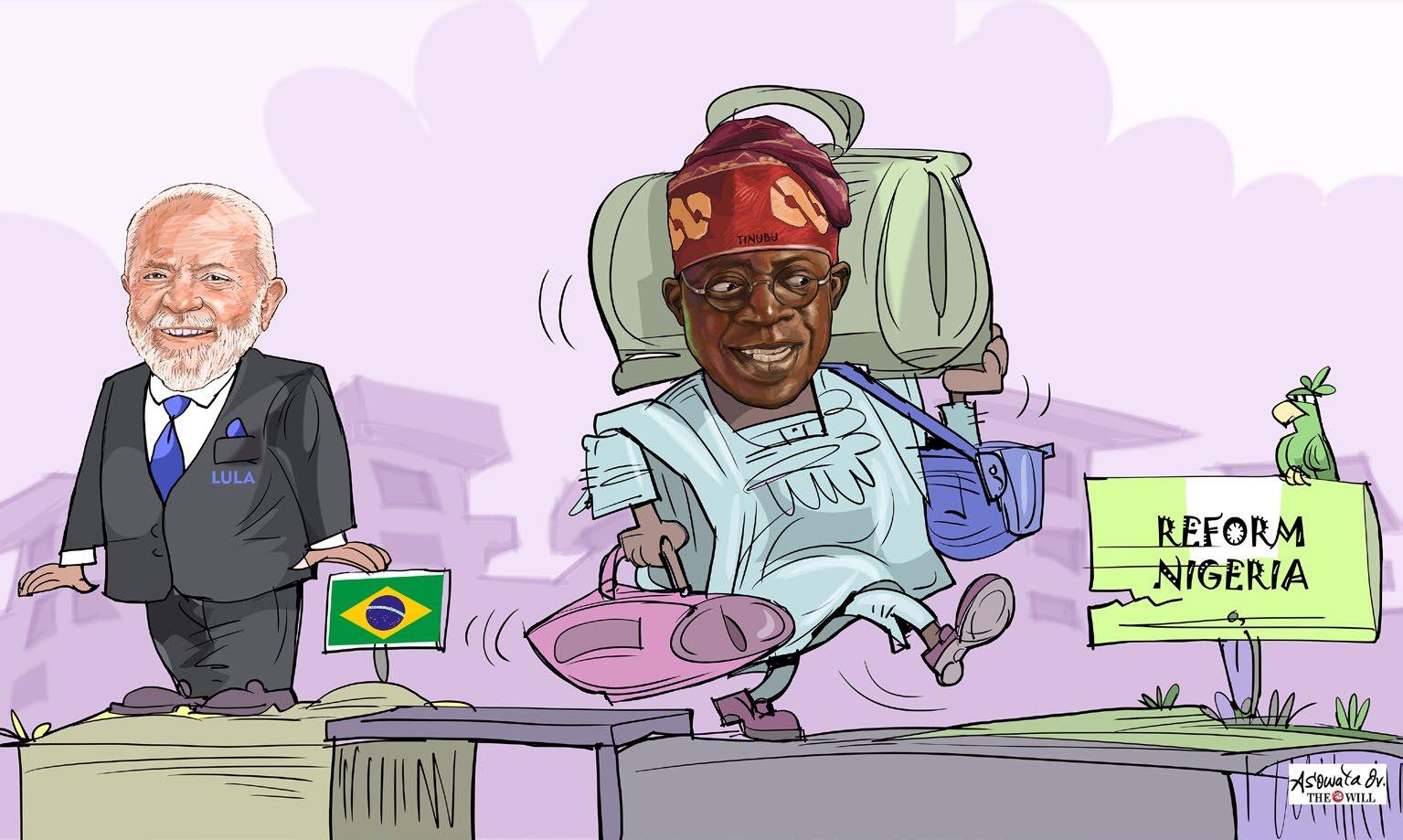
































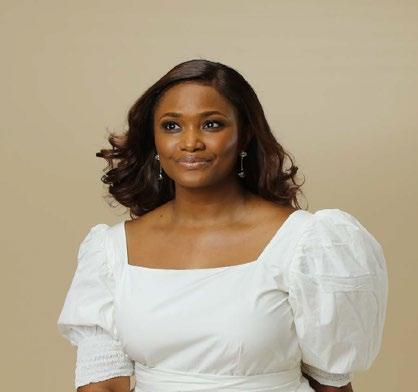

















Food is one of the most universal languages. It transcends borders, bridges cultures, and invites people to the table not just to eat, but to connect. In Nigeria, this language has found new speakers, creatives who are pushing the boundaries of flavour, presentation, and storytelling through cuisine. The culinary movement sweeping across the country is proof that food is no longer confined to recipes and traditions alone; it is evolving into a lifestyle, an art, and a career path that carries influence. Each new creation, whether a modern twist on a classic dish or a bold experiment with international flavours, tells a story about where Nigeria has been, where it is now, and where it is going.
Read all about the chefs making Nigeria proud on pages 8 to 10.
A minidress is flirty and versatile, but pairing it with the wrong shoes can throw your look off balance. Whatever the occasion, wearing the right pair of shoes will elevate your outfit, making you look stylish. Scroll to pages 4 and 5 to see the different types of shoes that will elevate your minidress.
As ladies, we generally want our makeup to be long-lasting and smudgeproof while we go about our daily tasks. Think waterproof makeup: that’s what page 12 is all about. We show you how to waterproof your makeup, so it stays locked in, no matter what your day throws your way.
We introduce a new columnist this week: Ada Obiajunwa. She will be writing about truths in ordinary moments. Her stories are captivating, so I urge you to read on page 11. This week, she writes about male friendships and how they can be quite different from female friendships. It makes for an interesting read. Let us know your thoughts.
Until next week, enjoy your read.







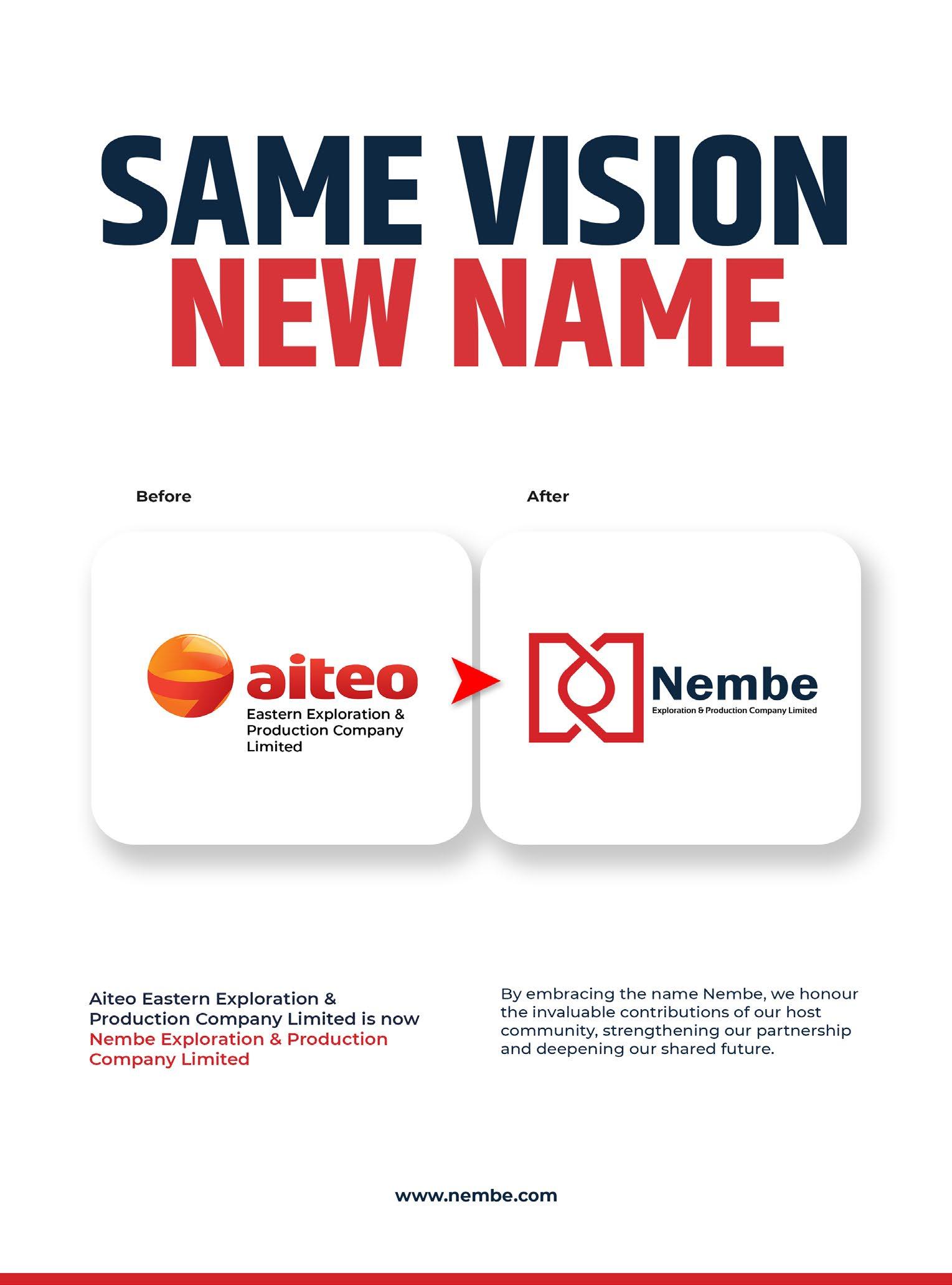
SUNDAY, AUGUST 31, 2025


SUNDAY, AUGUST 31, 2025




BY AMOS ESELE
President Luiz Inacio Lula da Silva of Brazil made a prediction about Nigeria and Brazil on April 12, 2005.
During a state visit to Nigeria, he affirmed before his Nigerian host, then President Olusegun Obasanjo at a joint media address: "If the 19th century was the century for Europe, the 20th century was the century for the United States. Why can't the 21st century be ours? It only depends on us and if we can believe in that. I believe that the time has come that we should look towards each other and that we should proceed. There are many things that we should do together which we have not yet done. Our trade relations could be much more intense. Our cultural relations can be much more intense too. Then our political liaison can be definitely much more than it is today.”
20 years later, President da Silva, who returned to office in 2022 after winning Brazil's presidential poll that year, consummated his forecast for his country and Nigeria.
On August 27, 2025, President Silva, welcomed Nigerian President Bola Tinubu to Brasília for a two-day state visit and together they concretised the 20-year-old dream in signed MoU in five key areas: Aviation, agribusiness, livestock security, trade and cultural exchange.
Memorandum of Understanding (MoU) formalising a Bilateral Air Service Agreement (BASA) between Nigeria and Brazil.
The agreement was signed by Keyamo alongside Brazil’s Minister of Transport, Silvio Costa Filho, in the presence of both presidents.
The BASA establishes a new framework for direct air connectivity between Nigeria and Brazil, opening fresh avenues for trade, tourism, investment and peopleto-people exchanges. It is expected to foster stronger economic integration, facilitate cultural ties and enhance diplomatic cooperation between the nations.
Both countries adopted Nigeria’s Air Peace as the operator of the Brazil-Nigeria route with the airline expected to begin commercial flights in the last quarter of the year. The airline will also build a Maintenance, Repair and Operations (MRO) facility with Brazilian aircraft manufacturer, Embraer providing technical assistance.
This agreement is a strategic milestone that underscores the Bola Tinubu administration’s commitment to expanding Nigeria’s global partnerships and creating an enabling environment for commerce and mobility.
The agreement marked a significant step in strengthening bilateral ties between the two largest economies on their respective continents and opened a vista on many fronts for Nigeria, which is still struggling with slow economic growth, high inflation and waning household purchasing power after 26 months of painful economic reform.
President Tinubu led a powerful delegation comprising senior government appointees, aides and players in the private sector to the South American powerhouse.
A major highlight of the visit was the signing of a
The Brazilian President, Luiz Inácio Lula da Silva, in his remarks, lauded the partnership, emphasising Brazil’s readiness to deepen ties with Nigeria in multiple spheres, including infrastructural development.
Also, Nigeria’s Minister of Innovation, Science, and Technology, Geoffrey Nnaji and Brazil’s Minister of Science, Technology, and Innovation, Luciana Santos, signed an MoU on cooperation in biotechnology, bioeconomy, ocean science, innovation ecosystems, energy, space development, digital transformation and raw materials research.






sector by modernising farming practices and ensuring national food security.
“We are very proud of what we are doing. We made a promise when we came in. We are fulfilling that promise. Two years ago, I sounded the alarm on our nation’s food security crisis. I demanded immediate and innovative solutions. That, again, is answered today—this is the first phase of it,” the President said at the occasion…
“This government recognises that agricultural productivity is synonymous with national stability and food sovereignty. The ability to nourish our population forms the bedrock of a prosperous nation. Our ambition extends beyond mere self-sufficiency.”
The President disclosed that the 2,000 tractors and accompanying implements would be distributed nationwide through a service-provider model to support small holder farmers with access to modern equipment, reduce manual labour and increase yields.
“We must seize this opportunity to achieve agricultural independence. Nigeria has the land, the people and the tools. Let history recall this day as the beginning of Nigeria’s agricultural renaissance—where modern technology met our farmers’ legendary resilience to Minister of Agriculture and Food Security Abubakar Kyari recalled four key initiatives launched under the Tinubu administration’s mechanisation policy. These include the John Deere Tractorisation Programme, the Greener Hope Project, the Green Imperative Programme and the newly launched 2000 tractors procured from Belarus.
According to him, the Belarus Project, implemented in collaboration with AfTrade DMCC and supported by the Republic of Belarus, delivered 2,000 high-quality tractors, 10 combined harvesters, 12 mobile workshops, 9,000 implements and 9,000 spare part kits. He added that the programme is expected to cultivate over 550,000 hectares of farmland, produce more than 2 million metric tons of staple food, create over 16,000 jobs and directly benefit over 550,000 farming households.
Other programme components include mandatory operator training, GPS-enabled tracking for accountability, a structured repayment model and pro bono equipment allocations to research and training institutions.
He further stated that the initiative will engage Nigeria’s youth through new roles in equipment handling, maintenance, logistics, extension services and agri-tech innovation.
The continued sordid operations in the oil sector, particularly with the country’s manager of the sector, the Nigeria National Petroleum Company Limited, NNPCL, has warranted the partnership of true, professional oil companies like Petrobras.
Harping on these deficiencies last Thursday, Bayo Ojulari, the GCEO of the NNPCL, said Nigeria was losing between $300 million and $500 million each month while the Port Harcourt Refinery was in operation. Ojulari, who made this statement during his meeting with the leadership of the Petroleum and Natural Gas Senior Staff Association of Nigeria (PENGASSAN) in his Abuja office, added that upon review of the refinery, he found why the country was pumping about 50,000 barrels of crude to go into the refinery, less than 40 per cent equivalent of what was coming in.
“The solution you are proposing (the NLNG model) is what we are working on. We’ve completed a technical review of the three refineries, but it’s not just about technical. It’s also about commercial viability. It has to make money. Maybe not a lot, but it should not be a loss. We’ve completed the commercial review of the Port Harcourt refinery and from that commercial review, we have come to the conclusion that the best way forward is to get a true professional refinery company to join us and co-operate with us.”
In the Aviation industry, Keyamo has been implementing policies that address mismanagement challenges, poor infrastructure, regulation, and improved airport facilities to support growth. Notable reforms include securing compliance with the Cape Town Convention, which facilitates aircraft leasing and financing, strengthening the Nigerian Civil Aviation Authority, NACA, NCAA, with a new digital portal and addressing issues like foreign airline trapped funds and the operations of a consumer protection portal to handle passenger complaints and enforce rules of engagement against airlines. Recently, the Federal Executive Council, FEC, approved N712 billion for the comprehensive renovation and modernisation of Murtala Muhammed International Airport, Terminal One.

The impact has been swift in the aviation industry. Within hours of signing the Bilateral Air Services Agreement (BASA) between both countries, the direct flight operated by Air Peace from São Paulo, Brazil, route landed at the Murtala Muhammed International Airport, Lagos, at about 3:15 pm on Wednesday, August 27, 2025.
Speaking on the development on arrival at the Lagos Airport, the Minister of Information and National Orientation, Muhammed Idris, said the direct flight reflects Tinubu’s policy of placing Nigeria first in global partnerships.
“This is not only about trade and investment; it is also about cultural and social connections between two parts of the world”, he said.
Noting that the direct flight would strengthen ties between the two countries, Idris commended Air Peace for its resilience and commitment to expanding Nigeria’s footprint in global aviation.
The Minister of Aviation and Aerospace Development, Festus Keyamo (SAN), who came on the flight, said the development marks a turning point in Nigeria’s aviation history and bilateral relations with Brazil.
As the third largest producer of civil aircraft worldwide after Boeing and Airbus, Brazil’s Embraer S.A., a multinational aerospace corporation which develops and manufactures aircraft and aviation systems, provides leasing, equipment, and technical support services, holds brighter prospects for Nigeria aviation industry in the light of the relations between both countries.
Mr Biodun Ajiboye, Executive Director and Chief Executive Officer of the National Institute for Orientation and Culture Development foresees the BASA agreement impacting culture, businesses between Nigeria and Brazil deeply.
“ Our trade relations could be much more intense. Our cultural relations can be much more intense too. Then our political liaison can be definitely much more than it is today
Speaking on Friday night on national television, he said, “To fly to Brazil, Nigerians used to spend almost three days. They first go to Ethiopia and then fly 14 hours to Sao Paulo, the centre of cultural ties between both countries. The Air Peace direct flight from Brasília to Nigeria, took seven hours and thirty minutes. For the 90 million Brazilians who are spiritually connected to Yoruba culture and used to visit in trickles, this aviation agreement is going to impact the tourism culture which is a N200 billion business. All we need to do now is to build infrastructure that would accommodate the expected influx of tourists.”
For the oil sector, Petrobras, the Brazilian state-owned oil giant is making a return to Nigeria’s energy sector, five years after halting its joint venture operations in Nigeria.
The Brazilian state-owned oil company has critical expertise in gas and oil development, specialising in deepwater oil exploration, gas development and operational excellence. Its return could be crucial for aiding the development of Nigeria’s vast hydrocarbon resources, estimated at 210 trillion cu. Ft., opening chances for domestic energy development, industrialisation and export growth.
“The planned return of Petrobras to Nigeria is a landmark moment that signals confidence in Africa’s energy sector and its long-term growth prospects,” said NJ Ayuk, Executive Chairman of the Africa Energy Chamber, AEC.
The AEC Chairman further said that the implications of this renewed partnership extend across multiple sectors. “For Nigeria, Petrobras’ presence will stimulate local content development, technology transfer and workforce capacity building. For Brazil, it presents new export and investment opportunities in a rapidly growing economy. For Africa at large, it signals that international investors recognize the continent as a strategic frontier for energy development and sustainable industrialisation.”
On diplomacy, the partnership with Brazil will open new vistas in geopolitics for Nigeria. Brazil is a founding member of the BRICS countries with a leverage beyond the South American continent. Yet to become a full member of the major bloc moving the world towards multi-polarity, Nigeria’s MoU with Brazil could further reinforce her status as "partner country" of the BRICS economic and political bloc since January 2025, thus providing a platform for independent action on the diplomatic front.
The most welcome prospect lies in agriculture. Nigerians need food, abundant, wholesome food for a majority of her over 200 million, known to be suffering from multidimensional poverty and hunger. For a country that deploys it mechanised agriculture to feed the world on soybeans, poultry, sugarcane production and Nigeria’s 80 million hectares of arable land is still largely operated on subsistence and threatened by prolonged insecurity until recently when the government made a major breakthrough in turning the tide in the war on insecurity with the arrest of leaders of the deadly Ansaru terrorist outfit.
“Brazil has a cattle herd of 238 million, even more than its human population. This success in agribusiness offers valuable lessons for us as we expand our livestock industry,” said Mr Sunday Dare, Special Adviser to the President on Media and Public Communication.
Taking a general view of the historic agreement between Nigeria and Brazil, Sunday Dare said, “It’s about transforming historic and cultural ties into practical, mutually beneficial investments that will boost Nigeria’s growth and global standing and greatly assists the government’s 'Renewed Hope Agenda' in harnessing Nigeria’s vast human and natural resources to create a diversified, self-reliant economy recognized as a global investment hub."

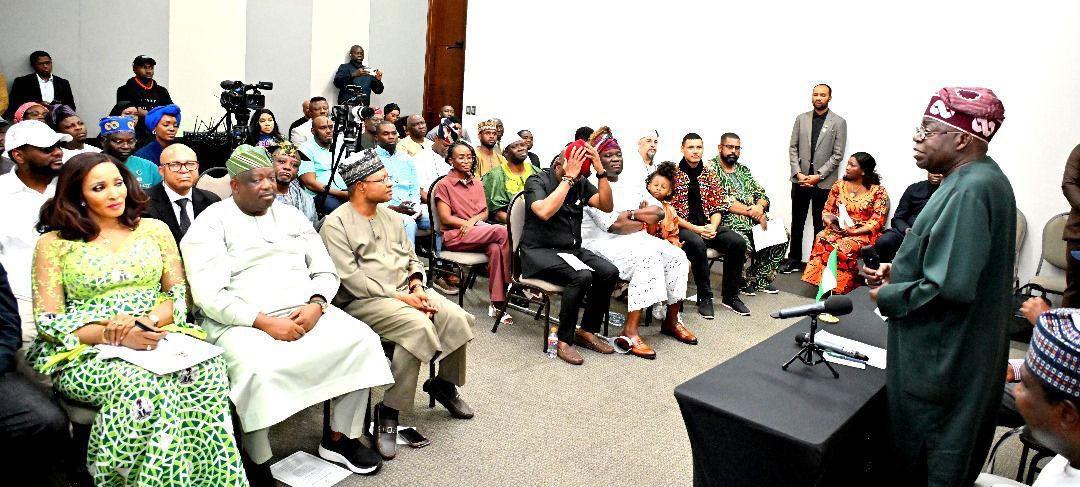
BY UDEME UTIP, UYO
On Thursday, the federal government outlined projects and initiatives executed in the SouthSouth region of the country, under President Bola Tinubu’s administration.
The disclosure was made at a forum tagged “Federal Government’s South-South Milestone Under President Tinubu’s Administration”, held in Uyo, Akwa Ibom State.
The Minister of Information and National Orientation, Alhaji Mohammed Idris, represented by Mrs Christiana Inyang, Head of the Federal Information Centre, Uyo, said the session was to highlight specific interventions in health, infrastructure, education, and agriculture.
According to him, new cancer care facilities, including radiotherapy machines and in-vitro fertilisation (IVF) units have been established at the University of Uyo Teaching Hospital (UUTH) and Mbribit Itam. He added that the 65-kilometre Akwa Ibom section
of the Lagos–Calabar Highway was a flagship project inaugurated in April by Senator David Umahi on behalf of the President.
The Minister explained that the administration was prioritising education, agriculture, and healthcare, sectors he said had suffered years of neglect.
In agriculture, Idris pointed to the cassava bio-ethanol project in Akwa Ibom, describing it as a venture intended to support food production, create jobs, and expand the agro-processing value chain.
The government, he added, also rolled out palliative measures in the state under a programme tagged “Boundless Support for Persons with Disabilities”.
Idris stressed that the Renewed Hope agenda was designed to achieve a more equitable distribution of projects across the federation.
He noted that the South-South was no longer left behind in federal planning, citing multiple ongoing initiatives as proof of policy direction.
Delivering a keynote speech at the event, Prof. Charles Obot, Head of Films and Multimedia Studies, University of Uyo, said the Presidential Loan and Grant Scheme had already reached more than 900,000 beneficiaries nationwide. He further disclosed that over 300,000 students had benefited from the Student Loan Scheme introduced by the current administration.
Obot added that a School of Education Administration complex was built at the College of Education in Delta State, alongside equipment and furniture upgrades at the College of Education (Technical), Asaba.
He argued that the interventions in education showed the government’s interest in both the “software” and “hardware” aspects of learning.
BY FELIX IFIJEH
The ongoing construction of 2,000 housing units, Renewed Hope City, at Ibeju Lekki, Lagos, has reached 80 percent completion.
The Minister of Housing and Urban Development, Arc. Ahmed Musa Dangiwa, who disclosed this during an inspection visit to the site on Thursday, August 28, said the City will soon be ready for the Presidential inauguration.
"The Ibeju Lekki Renewed Hope City project is 80 percent completed, with over 700 housing units under phase one ready for commissioning," Dangiwa stated, adding that the foundation laying for the second phase of the Lagos Renewed Hope City houses will be done by Mr President after the commissioning of the 700 units of the first phase.
“The Lagos Renewed Hope City, when fully completed, would deliver 2,000 housing units. The project underscores the commitment of President Bola Ahmed Tinubu to bridging the housing deficit in Nigeria”, he said.
Noting that the administration of President Bola Tinubu is currently building seven Renewed Hope Cities, one in each geo-political zone and the FCT, Dangiwa said, "The Renewed Hope Cities and Estates" initiative nationwide is aimed at


providing decent and affordable housing for Nigerians.
As part of his Lagos tour activities, the Minister visited the Lekki Economic Trade Zone and was conducted round by the Managing Director, Lekki Worldwide Investments Ltd, Adeniyi Akinlusi. He inspected various housing projects, industries, building materials, testing laboratories, the deep-seaport, Alaro City, Lagos Coastal City, and other ongoing developments.
Dangiwa commended Lekki Worldwide Investments for providing a strategic site for the Federal Government Building Materials Manufacturing Hub within the Lekki Free Trade Zone. He explained that the ministry plans to establish six Building Manufacturing Hubs, one in each geopolitical zone, aimed at reducing housing production costs through the facilitation of the production of local building materials.
They disclosed that an investor has already been secured for the manufacturing hub project, which will cut Nigeria’s housing deficit by boosting local building materials production.
"The hub will promote local content, curb rising costs of
materials, encourage domestic production, and ensure sustainable housing delivery nationwide", he disclosed.
Dangiwa said the intermodal transport infrastructure in Lekki, including a seaport, airport, rail and roads, will support the effectiveness of the hubs, adding that the infrastructure attracts real estate investments, as housing is required to support these developments.
Earlier, the MD/CEO of Lekki Worldwide Investments Ltd, Adeniyi Akinlusi, briefed the Minister on projects, noting that the free zone was designed to stimulate growth, reduce imports, attract investment, create jobs and boost housing.
At the Renewed Hope City site, the Executive Director, Loans and Mortgage Services, Federal Mortgage Bank of Nigeria (FMBN), Dr Muhammad Abdul, said the Ibeju Lekki houses are designed to be affordable and accessible to workers and cooperative societies, with the bank providing the lowest interest rates in the market.
During the inspection of Alaro City, in the Lekki zone, the Minister commended the management’s sustainable building efforts, saying it aligns with the government’s plan to close Nigeria’s housing gap.
Participants


BY FELIX IFIJEH
Nigeria and Brazil have reached a deal to strengthen economic and financial cooperation as part of efforts to boost bilateral ties between the two countries.
This was the outcome of talks between Nigeria’s Central Bank Governor, Olayemi Cardoso, and his Brazilian counterpart, Gabriel Muricca Gal Polo.
The engagement formed part of a broader working visit by the Central Bank of Nigeria (CBN) team to the Banco Central do Brasil during President Bola Ahmed Tinubu’s state visit to Brazil.
In addition to the Governor’s high-level discussions, the delegation also held a series of technical
Tmeetings with their Brazilian counterparts, covering monetary policy, financial stability, and regulatory cooperation.
Cardoso highlighted the importance of deepening institutional ties and knowledge-sharing between the two central banks, pointing to opportunities in payments systems, fintech, and mobile money.
“Nigeria is building a more resilient financial system to attract capital, harness diaspora remittances, and create a stable environment where trade and investment can thrive. Brazil’s experience in financial inclusion offers important lessons, just as Nigeria’s fintech sector has insights
of its own”, he said.
Cardoso also noted that Brazil’s large Afro-Brazilian community, the biggest population of African descent outside Africa, provides not only cultural linkages, but also significant potential to expand remittance flows between the two countries.
Gal Polo welcomed the talks and reiterated Brazil’s interest in broadening collaboration, describing closer ties as beneficial to supporting financial stability and shared prosperity.
Cardoso was accompanied by CBN directors overseeing currency operations, financial policy regulation, and monetary policy.
he United States government has announced plans to introduce a new fixed-term visa policy for international students and journalists.
Students have historically been granted a "duration of status" (D/S), allowing them to remain in the U.S. for the entire duration of their academic program.
However, the US state Department said a new rule, which will take effect on September 29, 2025, will replace the D/S framework with a four-year maximum period of admission and two years for students from countries identified as having high
overstay rates.
The rule affects F and J visas. F-1 visas are for academic students, and J-1 visas are for exchange visitors, including students. Under the new regulations, F and J visa holders from affected countries will be required to apply for an extension of stay to complete their studies, a process that may involve additional administrative burdens, costs, and delays.
This policy is directly linked to data from the U.S. Department of Homeland Security (DHS) and
its 2023 Entry/Exit Overstay Report. The report identified Nigeria as a country with a visa overstay rate above 10 percent in 2023, making it one of the nations subject to the new policy.
For Nigerian students, who have increasingly looked to the U.S. for educational opportunities, this adds a new layer of uncertainty. The proposed rule could significantly impact their academic plans and financial stability, as they will now face the added stress and cost of a new visa application process every two years.
The Director-General of the Bureau of Public Procurement (BPP), Dr Adebowale A. Adedokun, has called for the creation of procurement lawyers to address public procurement deficits and corruption.
A statement signed on Friday by BPP Head of Public Relations, Zira Zakka Nagga, said Adedokun made the call at the 65th Annual General Conference of the Nigerian Bar Association (NBA) in Enugu.
Emphasising the need for lawyers to understand the standard bidding document, the DG said, "If we are to reduce deficits in public procurement, lawyers must
take ownership of the standard bidding document."
He urged the NBA to consider training lawyers on the revised standard bidding document and other critical components of procurement reforms.
Adedokun also highlighted the importance of governance reforms, transparency, and capacity in addressing infrastructure deficits. He noted that without these reforms, increased funding would only lead to more waste due to corruption, weak institutions, and policy inconsistencies.
On infrastructure funding needs, he said annual
funding of $100 billion would be required to fund infrastructure. He gave a projection of $3 trillion needed over the next 30 years to close the infrastructure gap.
The BPP DG emphasised that procurement is a strategic enabler for national development, ensuring efficient resource utilisation and delivering value to citizens. He called for strong anticorruption measures, transparent procurement, and stakeholder engagement to bridge Nigeria's infrastructure deficit.
L-R: CEO, Ethiopian Investment Holdings, Dr Brook Taye; Ethiopian Prime Minister, HE Abiy Ahmed Ali; President/CE, Dangote Group, Aliko Dangote and CEO, Dangote Fertilisers Ltd, Vishwajit Sinha at the signing of a $2.5 billion fertiliser plant agreement in Addis Ababa on August 28, 2025.

Afaith-based civil liberties organization, the Muslim Rights Concern (MURIC), has described attacks on the Oluwo of Iwo, Oba Rasheed Akanbi, as Islamophobic. The group rejected the allegation of use of marijuana levelled at the monarch and called those behind the accusation as rebellious subjects, unscrupulous elements, mud-slingers and Muslimhaters. The group also congratulated the Oluwo on his recent victory at the Court of Appeal.
Executive Director of the organization, Professor Ishaq Akintola said on Saturday that,“Years after the installation of Oba Rasheed Akanbi (Telu I) as the Oluwo of Iwo, some envious Nigerians still call him names and launch false allegations at him. Our instinct tells us that it is the handiwork of rebellious subjects, unscrupulous elements, mud-slingers and Muslim-haters.
“It is Islamophobia. Some anti-Islam elements still find it
difficult to tolerate Oluwo’s bold and truthful stand on his faith in Islam. As the most outspoken Muslim traditional ruler in Yorubaland, the desire of Muslim-haters is to silence him. They use both mainstream and social media to commit their nefarious atrocities.*
He said those calling out the traditional ruler have by their actions constituted an infringement on Oluwo’s Allah-given fundamental human right. It amounts to cyberbullying contrary to Section 24(1)(a)(b) and 24(2)(a) – (c) of the Cybercrimes (Prohibition, Prevention, etc) Act 2015.
“It is on record that the Oluwo himself has debunked these rumours. They are false, baseless and unfounded Therefore, anyone found indulging in such illegalities again may have to face the legal consequences. He urged the Osun State Chapter of MURIC to work closely with progressive groups in the city
of Iwo in monitoring provocative pronouncements on both mainstream and social media targeted at the Oluwo.
“This stereotyping must stop. There are certain operatives of the ‘Pull-Them-Down’ (PhD) syndrome in this country who have made it their business to profile successful Muslims. They will have MURIC to deal with first. It is our duty as an Islamic human rights organization to stand up for Muslims who face such persecution.
"To his Royal Highness, the Oluwo of Iwo (Telu I), we say ‘Keep up the good work you are doing. Continue to serve your subjects with faith and sincerity. Your critics are mere distractions. Remain focused in your dedication to Allah and loyalty to the Nigerian nation. May the crown remain on your head, the beads around your neck, the horse tail in your hand and the queens in your palace till your last day."
The Movement for the Survival of the Ijaw Ethnic Nationality in the Niger Delta (MOSIEND) has commended the Nigerian Content Development and Monitoring Board (NCDMB) for successfully hosting an interactive engagement with media stakeholders and youth groups.
The engagement, held on Friday, in Port Harcourt, Rivers State, provided a robust platform for deepening understanding of NCDMB’s mandate, clarifying misconceptions, and highlighting achievements under the Nigerian Oil and Gas Industry Content Development Act (NOGICD Act).
In a goodwill message on behalf of the Executive Secretary, Dr Felix Omatsola Ogbe, the Director of Corporate Services, Alhaji Abdulmalik Halilu, revealed that the Board has fully automated its processes to deliver faster and more efficient services.
He disclosed that stakeholders no longer need to travel
to Bayelsa for permits or certifications, as all processes from contract processing and NGO funding to vendor categorisation are now automated.
Alhaji Halilu explained that such efficiency has earned NCDMB the number one ranking in Ease of Doing Business for consecutive years.
He also hailed NCDMB’s support for indigenous refining and gas utilisation, citing Watersmith Refinery, Butane Energy, Beta Gas, and the soon-to-commence Azikel Refinery, alongside the Board’s expanding role in global content and the Pan-African agenda. The interactive sessions allowed participants to raise concerns, seek clarifications, and receive direct responses from NCDMB officials.
In his brief, Dr Obinna Ezeobi, General Manager, Corporate Communications, reaffirmed the Board’s commitment to continuous stakeholder collaboration.
BY FELIX IFIJEH
According to him, the Board, which has its mandate, is not an interventionist agency but operates strictly under the Nigerian Oil and Gas Industry Content Development Act.
Three categories supported by NCDMB in the Bayelsa Media Awards (Print, Broadcast, and Economic Reporting) were highlighted, each carrying a N1 million cash prize and brandnew laptops for winners
Reacting after the event, Amb. (Dr) Kennedy Tonjo West, National President of MOSIEND, expressed satisfaction with NCDMB’s openness and inclusivity in engaging critical stakeholders.
MOSIEND reiterated its readiness to collaborate with NCDMB and other stakeholders to ensure that the Niger Delta people, especially youths and women, fully benefit from the Local Content agenda.
The Nigerian Postal Service has announced that all postal items sent from Nigeria to the United States, except letters and documents, will now attract a prepaid customs duty of $80 at the point of acceptance.
The new levy, which took effect on August 29, 2025, is in compliance with an Executive Order issued by the U.S. Government suspending duty-free exemptions for all countries
under the International Emergency Economic Powers Act. In a statement on Friday, NIPOST explained that the directive affects postal administrations globally and not just Nigeria. It also warned that stricter measures by airlines and cargo carriers on U.S.-bound shipments could cause longer transit and processing times, leading to possible delivery delays.

The agency disclosed that it is engaging with the Universal Postal Union, U.S. Customs and Border Protection, and airline partners to minimise disruptions.
“NIPOST remains committed to providing safe, reliable, and efficient postal and courier services despite this global regulatory adjustment,” the statement read.


L-R: Director, Nigerian Exchange Group (NGX Group), Dr. Okechukwu Crescent Itanyi; Director, NGX Group, Director-General, Securities and Exchange Commission (SEC), Dr. Emomotimi Agama; Director, NGX Group, Mrs. Fatima Wali-Abdurrahman; Group Managing Director/CEO, NGX Group, Mr. Temi Popoola; President Bola Ahmed Tinubu; Group Chairman, NGX Group, Alhaji (Dr) Umaru Kwairanga; Director, NGX Group, Mr. Mohammed Garuba; Director, NGX Group, Mr. Nonso Okpala; Head, Group Communications and Partnerships, NGX Group, Mr. Clifford Akpolo, during an audience with the President in Brazil towards the achievement of a $1 trillion dollar economy, on the sidelines of the president’s state visit to Brazil recently.
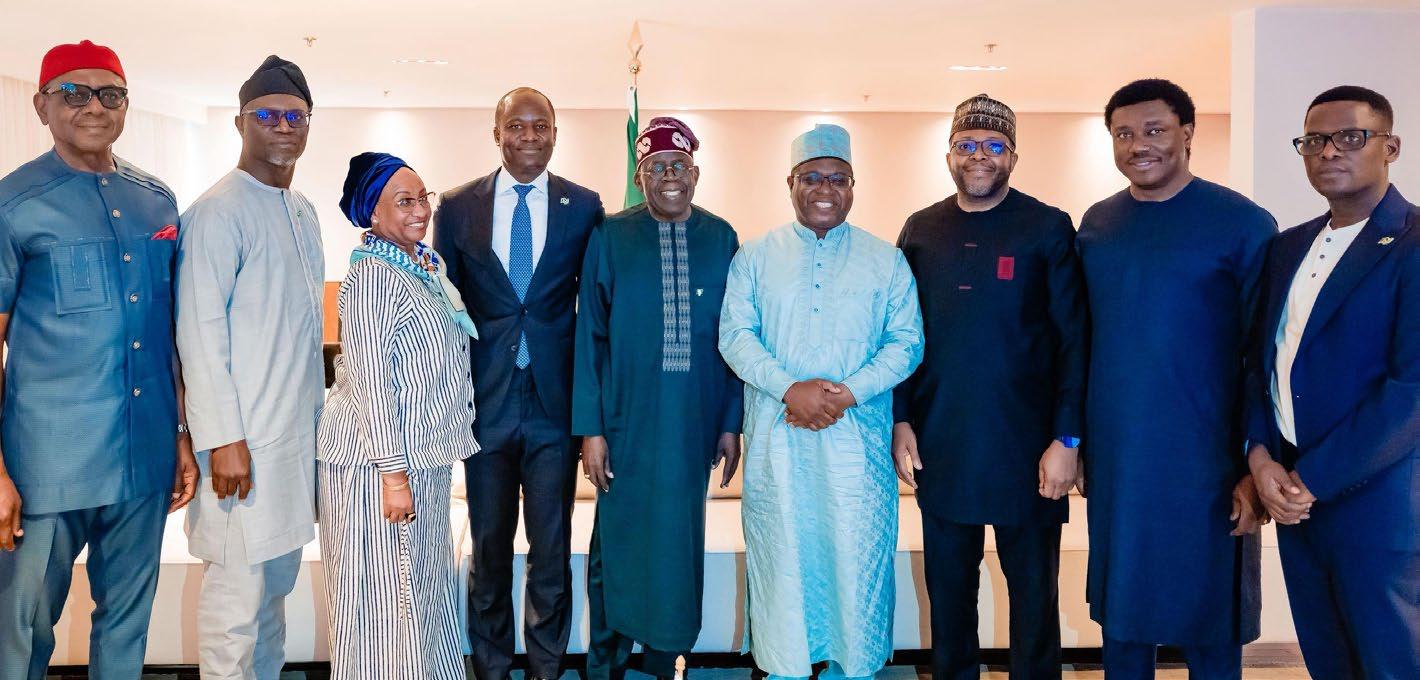
BY AMOS OKIOMA
Bayelsa State Governor, Senator Douye Diri, has asked the Ministry of Works and the companies handling the sandfilling and construction of the Ekeremor-Agge road to expedite action on the project, saying he remains committed to its completion before his administration winds down.
A statement by his Chief Press Secretary, Mr Daniel Alabrah, said Governor Diri gave the directive on Friday, during an onthe-spot assessment of the project.
So far, about seven kilometres have been sand-filled of the 27.8km first phase from Ekeremor town to Ndoro, with a spur to Peretorugbene community in Ekeremor Local Government Area of the state. The project is expected to be completed in 24 months.


His words, “What we have seen so far is encouraging. But I want the Ministry of Works to expedite action, as well as Pelfaco, the company that is doing the sand-filling, and
BY SAMPSON UHUEGBU

Lubrik Construction Company, which is handling the main road construction. They have to make sure that our timelines are met.
“Our first phase target is to get to Ndoro and have a spur to Peretorugbene. If we are able to achieve that in the remaining life of this administration, we are sure that whoever is coming next will complete the rest.
“There were some delays in starting the project, arising from my initial plan to first inaugurate the Sagbama-Ekeremor axis that we completed and thereafter partner the federal government to take the road further to Agge.
“Unfortunately, we have not been able to inaugurate the Sagbama-Ekeremor portion, which was handed over to us from the previous administration. So, we thought that rather than waiting, we should start something and that is why we are here now.”

Also, the Commissioner for Works and Infrastructure, Mr Moses Teibowei, said the two-year timeline was achievable and that the contractors have been fully mobilised.
The commissioner noted that having achieved a reasonable amount of sand-filling, the main construction work will commence next month, alongside the construction of an 80-meter bridge to Ndoro and another 150-meter bridge to Peretorugbene.
Speaking on behalf of Pelfaco Limited, Mr Kazeem Ajala said the ongoing clearing and sand-filling work to Ndoro would be completed in April next year.
He assured that with the filling of the road to a height of about 2.4 meters, there would not be concerns with flooding, and expressed the company’s readiness to deliver on the contract specification, given the adequate funding provided by the state government.
BY FELIX IFIJEH
The Rivers State Independent Electoral Commission, RSIEC, overcame last-minute legal and constitutional hurdles from aggrieved members of the public and conducted the poll for the 23 vacant chairmanship and councillorship seats in the 23 local government areas of the state amid predictions that the opposition All Progressives Congress, APC, will sweep the polls.
The state electoral commission cleared 16 political parties for the poll, but only two were active participants. Those cleared to participate were the Peoples Democratic Party, the APC, the Labour Party, the All Progressives Grand Alliance, the Zenith Party, the Accord Party, the African Action Congress, the Action People’s Party, and the Social Democratic Party.
Others are the Action Alliance, Youth Party, Young Progressive Party, Action Democratic Party, New Nigerian People’s Party, Peoples Redemption Party, African Democratic Party, National Rescue Movement, and the Allied People’s Party. However, only the PDP and APC participated fully, and even then, unequally.
PDP fielded only three chairmanship candidates, while the APC presented 20 chairmanship candidates across the state’s 23 LGAs. PDP fielded candidates in only three LGAs, namely, Obio/Akpo, Port Harcourt City, and Ogba/ Egbema/Ndoni where Dr. Gift Worlu, Allwell Ihunda and Chukwu Ogbugu participated, respectively. For the APC, candidates who are mostly allies of the Minister of the Federal Capital Territory, Nyesom Wike took the slots in all the 23 LGAs.
They included Confidence Deko for Gokana LGA, Dr. Chidi Lloyd for Emohua LGA, Obari Ollormate for Eleme LGA, Akuro Tobins for Okrika LGA, and Dr. Thomas Bariara. Others like PRP, YPP and APP have councill orship candidates in some LGAs.
What appeared to have happened with the other candidates on the platforms of other political parties is that some deals were struck with the APC to make the opposition party have a smooth ride at the polls. Candidates from the various political parties on the platform of All Party Candidates reportedly visited the APC Secretariat on Tuesday night and stepped down for candidates of the Okocha-led APC.
Commenting on the development, Okocha said, “Over 50 cleared candidates by the Rivers State Independent Electoral Commission (RSIEC), who are billed for the August 30 council polls from other political parties, visited our secretariat and announced their withdrawal from the race.”
Analysts described the development as part of the ongoing political realignments “engineered by Okocha and his close ally, the Minister of Federal Capital Territory, Nyesom Wike, to push the “Renewed Hope Agenda’ in Rivers State ahead of the 2027 elections.”
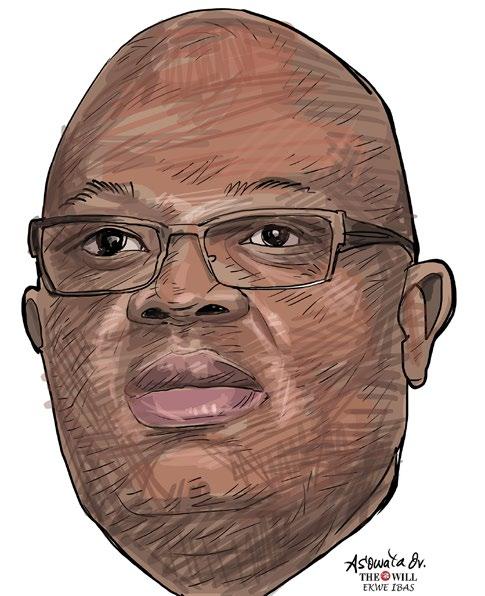
General of the Federation, the Rivers State Independent Electoral Commission (RSIEC), the presiding Judge, Justice Stephen Jumbo, ruled that the application lacked merit and dismissed it. However, the court granted a motion for substituted service to the defendants and its chairman.
Abayomi-Stanley sought an interpretation of a section of the RSIEC law and the Constitution of Nigeria, specifically on whether the President has the legal powers to appoint a chairman and members of the RSIEC to conduct local council elections in the state. It failed to fly.
Justice Stephen Jumbo dismissed the suit and directed that the council elections should proceed as scheduled. The case has been adjourned till September 10, 2025, for a hearing on the substantive suit.
In vain did a former All Progressives Congress (APC) candidate in the 2015 House of Assembly election in Port Harcourt Constituency 3, Chima Nnokam, and four others file a suit at the Rivers State High Court, urging it to declare the local council election as unconstitutional.
Also, the state chapter of the Civil Liberties Organisation (CLO), which insisted that the elections should be suspended, urging the state and Vice Admiral Ibas (rtd), to comply with the provisions of the Electoral Act, the Constitution, and the Supreme Court judgment of February 28, 2025, in conducting council polls, the Rivers Peace Initiative , which argued that peace should take precedence despite constitutional concerns
But the things happening in Rivers State are wrong and a defecation on our constitution,” he said, adding, “I am not here to push the influence of Fubara.
"Of course, I’m less concerned about whether he is the Governor or in the House of Representatives, but restore the democratic system to Rivers State. “Democracy should be seen and done in Rivers State and not the protection of individual influence, whether the influence of the FCT minister or the governor.”
After casting his vote during poll, Wike expressed optimism that emergency rule will be lifted after the elected officials are sworn in at the LGA.
He said, "As far as we are concerned, this election is peaceful, people are trooping out and at the end of the day the election has been conducted successfully and peacefully.
"I do know that by September 18, the state of emergency will expire and the state assembly will come back to their job and we will have a government at the grassroots level,”
The Supreme Court had, on February 25, 2025, nullified the earlier October 5, 2024, local government elections in which the Action Peoples Party (APP), backed by the nowsuspended Governor Siminalayi Fubara, claimed victories in 22 out of 23 local government areas.
But the citizens spoke their minds about the exercise. They flouted the restriction of movement order by the police, as some markets are seen in partial operation, while people are seen moving for their personal businesses.
After a series of protests for and against Governor Siminalayi Fubara and Minister of the Federal Capital Territory, FCT, Nyesom Wike, both of whom were locked in a prolonged supremacy battle in the state, the Federal Government suspended the governor as well as the lawmakers and imposed an emergency rule with the appointment of retired Naval ex-Service Chief, Ibok Ekwe Ibas as Sole Administrator on March 18, 2025.
Three months later, in June, suspended governor Fubara, Wike, and the political actors in Rivers State met with President Bola Tinubu in Abuja and resolved the political conflict between both camps. One of the points agreed was said to be the conduct of the local government election.

So, the legal and constitutional moves to stop the polls from being held failed. Civil Society Organisations in the state had disagreed over the legitimacy of the polls. But the State High Court in Port Harcourt legitimised it, having dismissed a motion seeking to halt the local council elections.
In a suit filed against the conduct of the election by a Port Harcourt-based legal practitioner, Williams AbayomiStanley, against President Bola Tinubu, the Attorney-

A legal practitioner, Chetam Nwala, claiming neutrality in the now resolved conflict between the former governor and his successor, appealed for common sense. But his appeal carried no weight.
“We are not fighting for Fubara at all; we are fighting for the soul of Rivers State and demanding that what is right should be done. Whether the governor has had an agreement with the FCT Minister to carry out what they are doing currently, what we are saying is that it is not our concern right now.
What appeared to have happened with the other candidates on the platforms of other political parties is that some deals were struck with the APC to make the opposition party have a smooth ride at the polls “





















Page N600, 000

000
Double Spread Half Page N1, 200, 000
10X6 N700, 000
10X5 N650, 000
10X4 N600, 000
10X3 N500, 000
9X6 N440, 000
9X5 N395, 000
9X4 N335, 000
9X3 N310, 000

8X6 N410, 000

8X5 N380, 000
7X5 N320, 000



7X4 N315, 000

6X5 N280, 000

6X3 N145, 000
6X2 N85, 000
5X2 N70, 000
4X4 N160, 000
4X3 N95, 000
4X2 N65, 000
3X3 N60, 000
3X2 N50, 000
2X2 N30, 000
2X1 N15, 000 1X1 N7, 000
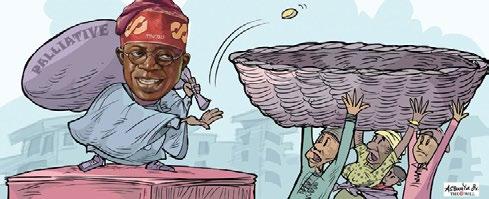









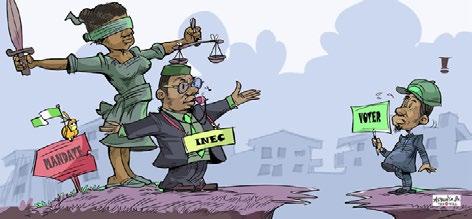













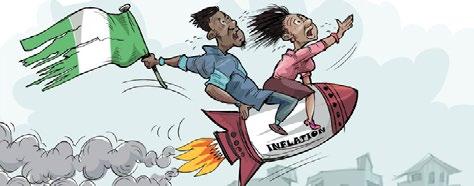
























The recent disclosure by the Chief of Defence Staff, Lt.Gen Christopher Musa, that politics is driving the insecurity in the country is not new, but it deserves critical appraisal and attention by the relevant authorities.
Coming on the heels of a Canadian Judgement that described Nigerian political parties as terrorist organisations, this statement by the army chief is not only an indictment of the political system but also a call to urgent action.
Indeed, similar calls have been made in the past by clerics and politicians themselves. But the calls have been treated with such levity that insecurity in the country has worsened. It is high time drastic action is taken.
According to General Musa in an interview on national television, criminals, both bandits and terrorists, work together.
“They have a common goal to make money and destabilise communities. But there is also a political angle. Some individuals don’t want peace because when there is peace, the government is seen to be doing well. When there is no peace, the government is seen to be failing, he said, adding, “last year, we recorded the lowest number of deaths. How come this year, suddenly, everything has spiked? Politics is coming, the election is coming. You cannot rule

We recall that Alhaji Kawu Baraje, former leader of the Peoples Democratic Party, PDP, who later defected to the governing All Progressives Congress, APC, once stated that the politicians in the then opposition APC imported Fulani militia from Senegal and Mali into the country to fight the 2015 presidential election
NIGERIA BUREAU: 36AA Remi Fani-Kayode Avenue, GRA, Ikeja. Lagos, Nigeria. info@thewillnews.com +234 810 345 2286, +234 913 333 3888
out the fact that some people are controlling these criminals to ensure there is no peace and governance is discredited. But the funny thing is, how do you kill the people you want to govern? What do you gain from it?”
On April 13, 2022, Governor Hope Uzodinma of Imo State spoke in the same vein. Speaking to State House Correspondents after briefing exPresident Muhammadu Buhari on the state of insecurity in his besieged state, he claimed that politicians were behind the killings in the country
“Those funding this banditry are politicians, which I challenge and call on security agencies to make their names available to the press because what they want to do is to distract a government that is focused. If this government is not doing well, I’ll be one of those that would have declared that the government is not doing well. But a situation where you’ll leave the formal way, ethical way of doing politics and you are now sponsoring banditry to bring down a government, for Christ’s sake, we should rise up and condemn it, all of us.”
Such lamentation confirms the notion that those aspiring to govern their compatriots are willing to kill, maim and destroy lives just to achieve their ambition.
Pray, what kind of human beings behave that way? Why do we know there are such criminals in the country
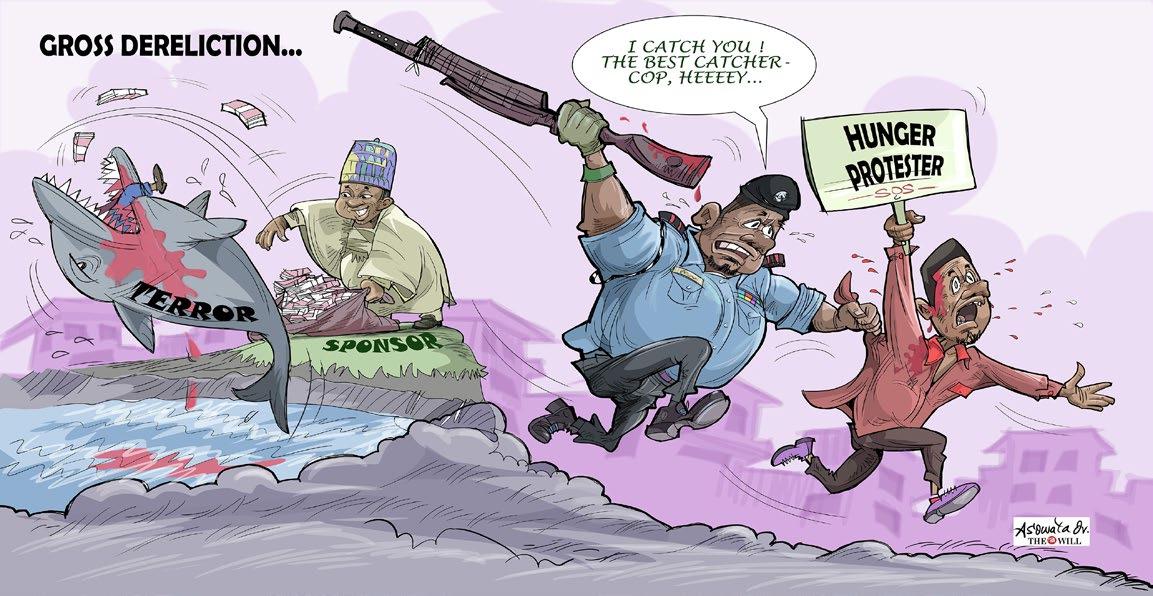
THE TEAM
PUBLISHER/EDITOR-IN-CHIEF




BY OKECHUKWU NWANGUMA
When the spokesperson of the Delta State Police Command, SP Bright Edafe, recently declared that operatives of the Nigeria Police Force (NPF) do not need a warrant to conduct random searches, many Nigerians were understandably alarmed.
Such a sweeping statement, if left unchallenged, risks deepening a culture of arbitrary policing and further eroding public trust in a Force already burdened with credibility crises.
The truth is more nuanced. While the Nigeria Police Act, 2020 and other statutes empower police officers to conduct searches in certain circumstances, those powers are not unlimited.
They must be exercised strictly within the confines of the Constitution, the Police Act, and the Administration of Criminal Justice Act (ACJA).
To claim that the police can, without warrant or suspicion, conduct random searches of citizens is both misleading and legally unsustainable.
The 1999 Constitution (as amended) guarantees the right to privacy (Section 37) and the dignity of the human person (Section 34). Arbitrary stop-and-search operations, if not backed by reasonable suspicion or lawful authority, directly violate these protections.
The Police Act, 2020, particularly Sections 1(2), 4, and 38, empowers the police to prevent and detect crime. Yes, officers may conduct stop-and-search operations. But the law is clear: such actions must be based on reasonable suspicion—not whim, convenience, or extortion.
The Administration of Criminal Justice Act (2015) also reinforces that searches of homes and private property require a warrant issued by a magistrate or judge, except in very limited emergency situations where delay would defeat the purpose of the search.
Nowhere in these laws is the concept of random, suspicionless searches endorsed.
In practice, what the police call “random searches” often degenerates into harassment, extortion, and abuse. Nigerians are familiar with the sight of officers stopping vehicles, demanding drivers’ phones, rifling through personal belongings, or insisting on “settlement” before allowing people to continue their journeys.
This is not policing; it is predation. It erodes citizens’ dignity, breeds resentment, and undermines the very trust that effective policing

Trequires. Worse still, it normalizes impunity—encouraging officers to act as though the law begins and ends with their discretion.
Both Nigerian courts and the ECOWAS Court of Justice have repeatedly warned against such arbitrary practices. The ECOWAS Court, in particular, has held that indiscriminate stop-and-search operations violate fundamental rights where not grounded in reasonable suspicion. Yet, the Nigerian police continue to ignore these rulings, deepening the culture of disobedience to court orders and international obligations.
A police spokesperson’s words carry weight. When an officer like SP Bright Edafe tells the public that the police need no warrant for random searches, he effectively authorizes lawlessness. He emboldens officers on the streets to disregard the Constitution, and he misinforms citizens about their rights. This is unacceptable in a constitutional democracy.
If the Nigeria Police Force is serious about reform and rebuilding public trust under the Police Act, it must:
1. Retract misleading statements and clarify to officers and the public that searches must be grounded in reasonable suspicion or lawful warrants.
2. Train police personnel on human rights and constitutional limits to their powers.
3. Comply with court judgments—both domestic and regional—that have struck down arbitrary policing practices.
4. Educate citizens about their rights during police encounters, rather than encouraging blind submission to illegality.
IN PRACTICE, WHAT THE POLICE CALL “RANDOM SEARCHES” OFTEN DEGENERATES INTO HARASSMENT, EXTORTION, AND ABUSE
The police are a creation of the law; they cannot place themselves above it. Random, suspicionless searches have no place in a democracy governed by a Constitution. What Nigeria needs are not blanket authorizations for abuse, but a disciplined, rights-respecting police service that understands its powers and their limits.
Anything less is an invitation to anarchy—and a betrayal of the very citizens the police are sworn to protect.
•Okechukwu Nwanguma, Executive Director, Rule
BY ABIODUN KOMOLAFE
here was a delusion that the privatisation of the power sector - an existing, dilapidated monopoly - would be as straightforward and eventually beneficial as the transformative liberalisation of the telecommunications industry. What we are now witnessing is the shattering of that illusion, with the critical failure of the electricity sector. The entire framework was rushed, ill-conceived, and frankly, a disgrace to Nigeria.
As with many things in Nigeria, a political elite, in a moment of cynical opportunism and historical amnesia, miscalculated that the success of the telecommunications sector would be effortlessly replicated. This was an almost ridiculously naive assumption, because the telecommunications industry was a blank slate built from scratch on new technology and a fierce, consumer-driven competitive environment.
In contradistinction, those who bought into the so-called electricity privatisation were fixated on creating monopolies and fiefdoms, where the consumer counted for nothing. This was the direct opposite of the competition-driven, marketing-savvy telecommunications framework. The outcome, of course, was a total disaster, and the rest is history! Without electricity, no country can develop its basic industries or a continuously expanding manufacturing base to create jobs.
What’s now to be done? A more fundamental question is whether the nation possesses the intellectual humility to admit that an urgent, comprehensive reworking of the process is needed. The concept of privatising the Transmission Company of Nigeria (TCN) is a final, desperate plea to private capital to fix what political incompetence has broken. Foreign and local investors should be encouraged to take the driving seat. There’s no alternative to this because a robust transmission network is the critical, missing link between power generation and distribution.
The concept of a centralised national grid should be replaced by a decentralised system. As then-presidential candidate Barack Obama pointed out, even in the United States, the idea of a single national grid is outdated. Under a competitive framework, Nigeria’s six geopolitical zones should have their own independent grids.
Furthermore, major commercial hubs such as Lagos, Kano, Abuja, and Rivers should have separate, selfcontained grids. This is simply common sense! In the Year of our Lord 2025, the persistence of a single national grid reflects the self-defeating mindset of a quasi-federal system. A proper federal system would have abandoned this outdated concept decades ago. The
Federal Government’s decision to empower states on the concurrent list to determine their own electricity framework is right. This approach is consistent with practices in countries like India, Canada, and Brazil.
The creation of the Nigerian Electricity Regulatory Commission (NERC) raises a critical question: Should Nigeria even have a Ministry of Power? A similar argument could be made regarding the Ministry of Communications, especially as the National Communications Commission (NCC) is in place. Ditto for the Ministry of Agriculture and Food Security.
If the Ministry of Power must exist, its primary role should be to coordinate the sector’s liberalisation and competitive framework. This would involve collaborating with the Ministers of Finance and Industry, Trade, and Investment to develop robust regulations and secure the necessary funding to advance the renewable energy sector.
The core focus of the ministry should, therefore, be to facilitate real competition by breaking up the transmission of power. Nigeria must go all-in on renewable energy. It’s unacceptable that a country with significant lithium deposits in Nasarawa State is not negotiating to develop a massive, value-added, lithium-powered factory base. Unless we break from our fixation on fossil fuels, our efforts will be in vain.
A redefined Ministry of Power would have significant implications for policy and practice, demanding a shift from a traditional, centralised model to one that is more decentralised, agile, and market-oriented. Policymakers must focus on creating a robust regulatory framework that encourages private sector participation, renewable energy integration, and smart grid development. This involves establishing clear and transparent rules for licencing, tariff setting, and grid access, which would attract essential investment and innovation. For instance, policies could incentivise the adoption of distributed energy resources like rooftop solar panels and micro-grids. Uruguay achieved 91% of electricity generation from renewables in 2022, transitioning from fossil fuel dependence. Morocco leveraged solar energy with the Noor-Ouarzazate complex, one of the world’s largest concentrated solar farms.
NIGERIA MUST GO ALL-IN ON RENEWABLE ENERGY. IT’S UNACCEPTABLE THAT A COUNTRY WITH SIGNIFICANT LITHIUM DEPOSITS IN NASARAWA STATE IS NOT NEGOTIATING TO DEVELOP A MASSIVE, VALUE-ADDED, LITHIUMPOWERED FACTORY BASE
Kenya developed the Lake Turkana Wind Power Project, Africa's largest wind farm, contributing significantly to renewable energy. Iceland generates almost 100% of its electricity from renewables (hydropower and geothermal), with geothermal power heating most homes. With the right expertise and needed political will, we can say it’s better late than never!
A massive breakthrough is possible if the government can secure the funds for wind turbines along Nigeria’s coasts, a sector with
*Continues online at www. thewillnews.com




Continues from page 34
system upgrade to survive the stiff competition from the recapitlisation exercise. This is yielding fruits as the banks are recording significant increase in digital banking revenue as they expand their systems and engage in aggressive marketing.

– a surge of N85.67 billion or 122.3 percent increase.
Continues from page 34
banking presence,” the statement partly reads.
our Group.
The swell in EMTL funds also contributes to the remarkable increase in the FAAC proceeds shared by the three tiers of government and the derivation funds allocated to oil-producing Nigeria’s nine oil-producing states amassed a total of N781.83 billion as statutory13 percent derivative fund from the Federation Account Allocation Committee (FAAC) in the first six months (H1) of 2025, according to data by the National Bureau of Statistics (NBS). The figure constitutes a 128.83 percent increase on the N440.17 billion difference between the
The 13 per cent derivation fund is a constitutional provision ensuring that states producing crude oil receive additional allocations from the Federation Account. The principle is meant to address the effects of oil extraction, foster local development, and reduce infrastructural deficits in these
Details of the NBS reports showed that Delta stands out among the nine states with the largest share of derivative fund. It received N228.62 billion in H1 2025 against N113.78 billion in the previous year showing a difference of N114.84 billion or 101 percent increase.
Akwa Ibom which received N70.01 billion in H1 2024 amassed N155.68 billion this year
Bayelsa pooled N165.90 billion in H1 2025 against N64.04 billion in the corresponding period last year showing an increase of N101.86 billion, representing a rise of 159 percent.
Rivers experienced the same growth trajectory with N89.9 billion increase in H1 2025 constituting a 153 percent over N58.78 billion recorded in H1 2024 against N148.68 billion in the review period.
Edo, which was allotted N11.90 billion in H1 2024 recorded a significant surge of N23.44 billion in the first six months of 2025 translating to an increase of N11.54 billion or 96.97 percent rise.
Ondo received N19.72 billion in H1 2025 compared to N10.05 billion in the preceding year – showing a positive difference of N9.67 billion or 96.2 percent increase.
The single-digit recipients in H1 2024: Imo, Abia and Anambra, experienced a significant upsurge in the review period.
Imo recorded an increase of N12.1 billion to hit N17.82 billion in H1 2025 against the relatively paltry N5.72 billion received in the previous year – an increase of 211.53 percent. Abia which received the least in H1 2024 –N3.19 billion, experienced a surge of N7.88 billion in H1 2025 to hit N11.07 billion, constituting a jump of 247 percent.
Anambra earned an increase of N6.8 billion in H1 2025 over N4.13 billion it received in H1 2024 showing a 164.6 percent rise over the previous year’s corresponding period.
The bank further stated that the capital injection ensures GTBank’s compliance with the new minimum capital requirement for commercial banks with international authorisation stipulated by the CBN.
It added that the “capital injection was funded by the two-phased equity capital raising programme recently undertaken and concluded by GTCO Plc with an international fully marketed offering on the London Stock Exchange that secured $105m from highquality, long-term institutional investors in exchange for 2.29 billion new ordinary shares, making GTCO Plc the first financial services institution in West Africa to dual list on both the NGX and LSE.”
It continued, “Launched in July 2024, GTCO’s equity capital programme began with a public offering to Nigerians that raised ₦209.41bn from 130,617 valid applications for 4.7 billion ordinary shares, fully allotted and evenly split between retail and institutional investors.”
Commenting on the recapitalisation of Guaranty Trust Bank Ltd, Group Chief Executive Officer of GTCO Plc, Segun Agbaje, said, “The successful recapitalisation of our flagship banking subsidiary, Guaranty Trust Bank Limited, marks a pivotal step in strengthening the foundation of
“With significant new capital secured and the CBN’s recapitalisation directive for Guaranty Trust Bank now fulfilled, we are focused on deepening innovation and service excellence, delivering improved performance, and expanding our footprint across high-growth markets, while upholding the industry-leading standards that define the GTCO brand.”
The additional equity capital will be deployed by GTBank primarily for branch network expansion and asset growth (loans, advances, and investment securities portfolio), fortification of its information technology infrastructure, and to leverage emerging opportunities in Nigeria and the operating environments where it maintains banking presence.
“Following the capital injection, the company continues to hold 100 per cent of the entire issued and paid-up share capital of the bank. None of the Directors of the company has any interest, direct or indirect, in the bank,” the statement concluded.
GTCO is among the Tier-1 financial services institutions occupying the top echelon of the industry. GTCO closed its last trading day (Friday, August 29, 2025) at N92.00 NGN per share on the Nigerian Exchange (NGX). The stock began the year with a share price of 57.00 NGN and has since gained 61.4% on that price valuation.
Conference on Science, Technology (STICOMMSLOC) in collaboration
from 21st-23rd October, 2025, at the Science, Technology and Innovation

According to him, without effective translation of research into policies, products, and public understanding, the knowledge economy that Nigeria aspires to build would remain a distant dream, noting that the conference seeks to address these challenges.
Okolo-Obi said "For the first time, we are bringing together researchers, industry leaders, policymakers, the media, educators, and the public on a single platform to chart a new course.
Our focus will be on breaking barriers of technical language, strengthening partnerships, training a new generation of science communicators, and advocating for policies that institutionalize science communication in Nigeria.”
He said the initiative aligns fully with President Bola Ahmed Tinubu's Renewed Hope Agenda, which emphasizes economic diversification, innovation-driven growth, human capital development, and inclusive governance where

knowledge is translated into wealth, and innovation creates opportunities for every citizen.
In his welcome remarks, President, African University of Science and Technology (AUST), Professor Azikiwe Peter Onwualu said the institution is proud to be the host of the conference, adding that the school has an innovation hub where
work is ongoing to commercialize its recent outputs. The school secured 10 patents in the last one year.
Also speaking, a member of the Local Organizing Committee, and Director Information, New Media and Protocol at the National Agency for Science and Engineering Infrastructure (NASENI), Mr. Olusegun Ayeoyenikan said there is need for citizens to promote the culture of STI as it is key to Nigeria’s industrial development.
"This is a milestone when it comes to building the consciousness to be patriotic because what we have is basically the lack of culture for science, technology and innovation”, he said while calling on all stakeholders to strive to push the process.
The LOC also urged the media to play a pivotal role in driving the initiative, urging journalists to own the event which will be held annually to improve Nigeria's push for sustainability in STI.
When systems forget people, people stop believing in them.
We’ve all been there. A form that leads to another form, a phone call that ends in a dead-end or a waiting room-literal or digitalthat seems to stretch on forever. You follow the steps, tick the boxes, and yet somehow, the system feels like it's working against you, not for you.
That is bureaucracy. And when it works, it provides structure, fairness, and accountability. But when it doesn't? It quietly chips away at trust. Not just in the process, but in the institutions behind it, and eventually, in the people meant to serve within them. It's not always about inefficiency. Sometimes it is the tone - language that confuses instead of clarifies, systems that protect themselves instead of the public, processes that are technically correct, but emotionally disconnected. I live and work in a Francophone country, this is all too familiar!
The erosion doesn't happen overnight; it starts small. A clerk who refuses to make eye contact. A website that crashes when you are halfway through your application. A policy written in language so dense it might as well be in code. Each interaction becomes a tiny referendum on whether the system values you as a person or sees you as merely another case number.

I think about the single mother trying to renew her work permit, shuttling between offices in Abidjan with her twins in tow, only to be told she is missing a document that wasn't mentioned on the website. Or the small business owner in Port Harcourt who spends three days navigating licensing requirements, each department sending him to another, claiming they are not the right office.
Over time, people notice. They may not call it ‘bureaucratic failure,’ but they feel it. In the nurse who is too stressed to explain, or the agency that loses your documents in the online platform, requests your information again and again, and still gets your name wrong. In Nigeria, we have coined a term for this, ‘anyhowness’. These are not just annoyances; they are tiny ruptures in trust, and when they pile up, they start to say: "you don't matter here." This ultimately leads to an attitude of complacency among otherwise committed individuals and citizens.
THE PSYCHOLOGY OF SYSTEM BREAKDOWN
What fascinates me is how predictable this erosion becomes. People do not wake up one day deciding to distrust institutions. It is a gradual process, like water wearing away a stone. First comes confusion: "why is this so complicated?" Then frustration: "surely there must be a better way?" Then resignation: "this is just how things work", also known as "manage it like that.” And finally, cynicism: "the system is not broken; it is working exactly as intended to keep us out."
But here's the thing: people are incredibly patient, until they are not. They give systems time. They will
fill out the forms and wait in the queue. What they want in return is not perfection, but dignity. To be seen, heard, and feel like someone, somewhere, cares enough to try.
I have seen this patience tested in remarkable ways across our continent. Graduates who return to the same ‘youth service secretariat’ office five times, each time maintaining their composure, explaining their situation with fresh hope that this time, things will be different. There's something both admirable and heartbreaking about this faith in institutional possibility, even in the face of repeated disappointment.
The real danger is not just individual frustration, it is collective disengagement. When enough people lose faith in systems, those systems begin to lose their legitimacy. Citizens stop participating and find workarounds that often undermine the very goals the bureaucracy was designed to achieve. They turn to informal networks, black markets, or simply give up on accessing services they need and deserve.
In many developing economies, this dynamic is particularly stark. I have watched brilliant entrepreneurs in West and Central Africa abandon formal business registration processes and operate in gray markets, not because they want to avoid taxes or regulations, but because the bureaucratic maze is simply insurmountable. As a result, the system loses both their contributions and their compliance. The social contract begins to fray; if an institution does not hold up their end, providing clear, accessible, dignified service, why should citizens hold up theirs? This is not just about government agencies. It extends to healthcare systems, educational institutions, corporate customer service, and even non-profit organisations which claim to serve the ‘public good’.
Living in a Francophone context has given me a particular lens on this challenge. There is often a cultural formality to institutional interactions that can feel both dignified and alienating. The language of administration carries weight, sometimes too much weight. Forms that could be simple, become exercises in linguistic precision; processes that could be streamlined, get tangled in procedural correctness. I have sat in prefectures where the reverence for process sometimes overshadows the purpose of that process; where getting the stamp in the right color ink matters more than ensuring the citizen understands what happens next. It is not malicious; often, it is the opposite. It is a deep belief in the importance of doing things properly. But when ‘properly’ becomes disconnected from ‘helpfully,’ something essential is lost.

People do not wake up one day deciding to distrust institutions. It is a gradual process, like water wearing away a stone. First comes confusion: "why is this so complicated?" Then frustration
I have learned that bureaucracy does not have to be cold. It can be thoughtful, humane, dare I say, even empowering–but it takes intention. It requires remembering that at the other end of every process is a person, often navigating the system not because they want to, but because they need to.

The best systems I have encountered, such as the one in Singapore, share certain qualities. First, they assume good faith on the part of citizens. Second, they provide multiple ways to accomplish the same goal. Third, they communicate in plain language. Fourth, they build in human touchpoints where complexity requires explanation. Most importantly, they measure success not just by compliance or efficiency, but by user experience and outcomes.
I think of Estonia's digital government services, where citizens can accomplish most administrative tasks online in minutes, not months. Or Singapore's whole-of-government approach, where different agencies share information so citizens do not have to repeat their stories multiple times. These are not just technological solutions, they are philosophical ones. They start from the premise that the government exists to serve citizens, not the other way around.
This transformation does not require revolutionary change. Often it starts with revolutionary empathy. A customer service representative who takes thirty seconds to explain why a form is necessary. A website that saves your progress so you do not have to start over. A waiting area with clear signage and realistic time estimates. These may seem like small things, and ‘oversabi’ as we say in Nigeria, but they send a powerful message: we see you, we value your time, and we want this to work for you.
So, maybe the invitation is simple: to reimagine how we design the public experience. To build systems that serve, not just manage. To restore trust not through grand gestures, but through small acts of clarity, empathy, and respect.
The choice is ours: design for dignity, or accept the consequences of indifference.
Aramide Abe is a networking expert and a professional in international development. She is the convener of an African business leader network - Naija Startups. Follow arams on Twitter, Website - www.aramide.ng




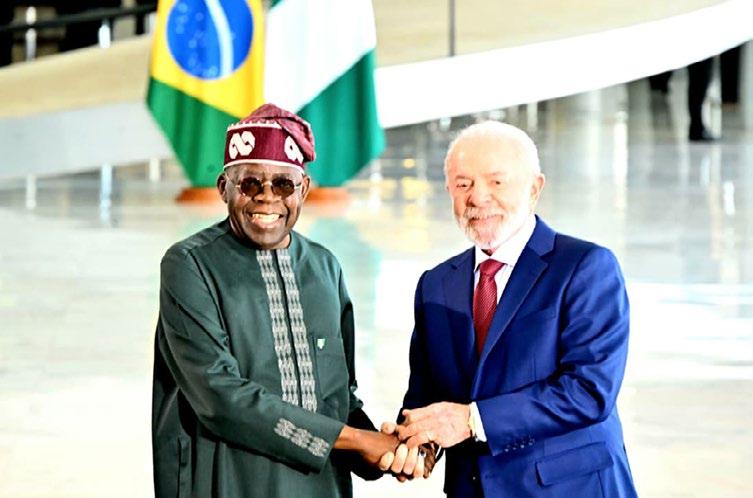

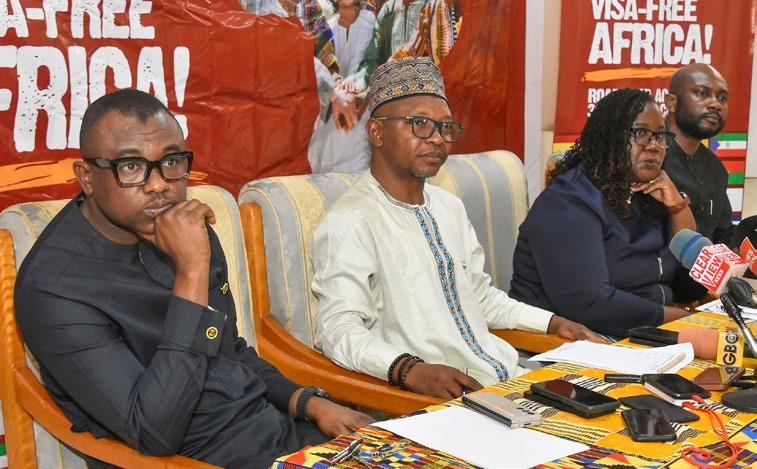
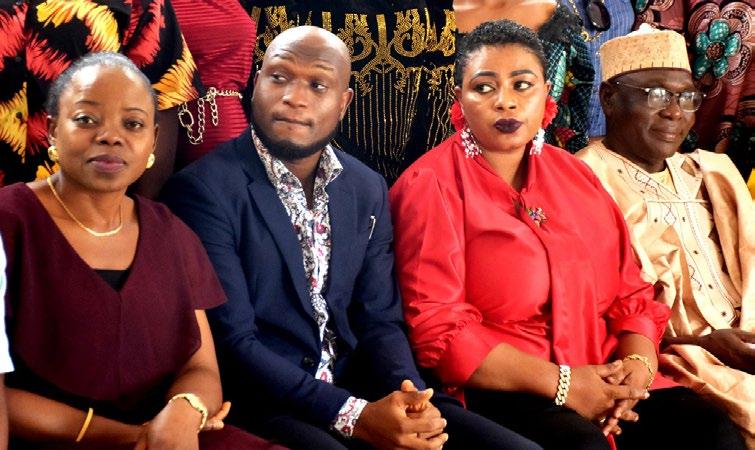
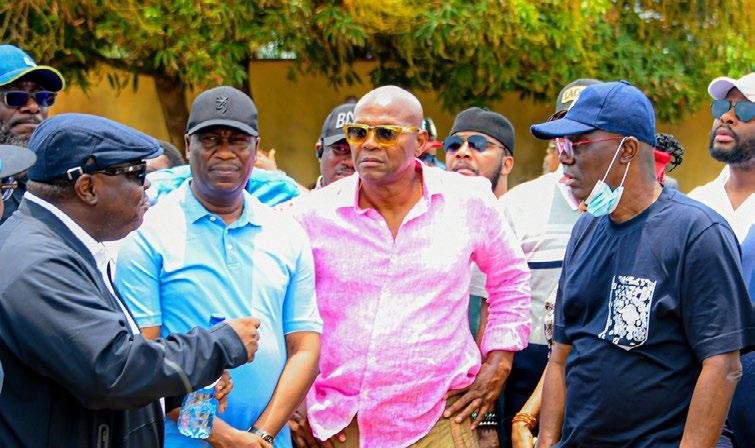


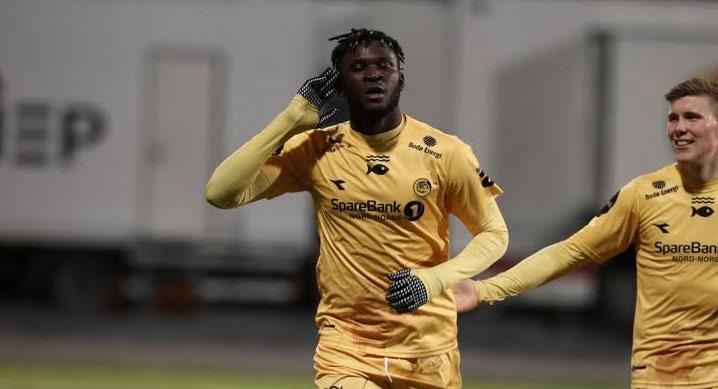
BY JUDE OBAFEMI
AC Milan withdrew from their pursuit of Victor Boniface last week after the Nigerian striker failed a comprehensive medical examination, with the Serie A club citing serious concerns over his injury-prone right knee and its implications for a potential €25 million investment.
The proposed transfer, structured at a €5 million loan with an obligation to purchase for €24-25 million, collapsed following four days of intensive medical testing at Milan's Milanello training facility. The decision constitutes a significant setback for both club and player, illustrating the increasingly rigorous medical standards applied to highvalue transfers in modern football.
Boniface's extensive injury record ultimately proved insurmountable for Milan's medical team. The 24-year-old has endured two anterior cruciate ligament ruptures to his
Failed medical examinations have long been part of football folklore “
right knee, the first occurring in March 2019 during his tenure with Norwegian side Bodø/Glimt, which sidelined him for 179 days. A second, more severe ACL tear in November 2020 kept him out of action for 358 days, effectively derailing his progress during a crucial developmental period.
Beyond the major knee injuries, Boniface has battled recurring muscle problems throughout his career. An adductor strain in 2024 cost him 85 playing days, while various other muscular issues have contributed to a total of 127 missed matches across six different injury types since turning professional. Speaking candidly about the medical setback during a live stream, Boniface acknowledged the role his injury history played in the transfer's collapse. "The transfer did not work out because of my past injuries," he stated. "I had two injuries to my right knee, and that is it."

Milan's decision demonstrates broader shifts in how elite clubs approach player recruitment amid tightening financial regulations. The club's medical team conducted exhaustive examinations including advanced imaging of Boniface's knee joint and comprehensive fitness assessments designed to evaluate long-term durability.
Medical research indicates that players who have suffered multiple ACL injuries face a 20-30% likelihood of recurrence, with each subsequent tear potentially more severe than the last. Such statistics have become central to transfer decisionmaking processes, particularly for clubs operating under UEFA's Financial Fair Play regulations, which limit spending relative to revenue streams. The financial implications of injury-prone signings extend far beyond transfer fees. The English Premier League analysis suggests clubs lose an average of £45 million annually due to injury-
related costs, including wages for unavailable players, rehabilitation expenses, and reduced prize money from poor performances. For Milan, recent ownership changes under RedBird Capital Partners have emphasised fiscal responsibility and sustainable growth strategies.
The Milan collapse constitutes the second major transfer failure for Boniface within eight months. In January, a lucrative move to Saudi Pro League powerhouse Al Nassr fell through under remarkably similar circumstances, with medical concerns over his knee conditioning proving decisive in a deal reportedly worth N60 million.
Boniface later revealed the psychological impact of that setback, admitting he had "packed his bags and was ready to go" before receiving news of the medical rejection. The repeated pattern suggests that while the striker has successfully returned to competitive action, concerns about his long-term physical sustainability continue to deter potential suitors willing to make substantial financial commitments.
The situation mirrors broader trends in international football, where clubs increasingly view medical examinations through the lens of crucial risk-mitigation tools rather than routine formalities. Advanced diagnostic techniques now allow medical teams to identify potential future problems that might not manifest for months or years, fundamentally altering how transfers are evaluated.
Despite his injury troubles, Boniface has shown remarkable determination and quality when available for selection. His journey from Nigerian youth football to European prominence began with a move to Bodø/Glimt in 2019, where he established himself in a promising forward before transferring to Belgian side Union Saint-Gilloise.


ogannah@thewillnews.com
Nigeria’s public university system is once again facing a potentially serious disruption, with lecturers across campuses holding coordinated protests and warning that a full strike could follow if government delays continue over wage increment and entitlements.
Demonstrations took place on August 26 at several institutions and union leaders indicated that nationwide action remains on the table. Meetings were scheduled in Abuja to calm the situation, but the Academic Staff Union of Universities (ASUU) said no formal invitation was received and stressed that dialogue without firm decisions would not be enough. The prospect of another shutdown of universities has drawn widespread concern from students, parents and education stakeholders who recall how recent strikes paralysed learning for months at a time.
The roots of this dispute lie in the renegotiated 2009 agreement between ASUU and the Federal Government, a deal that has been revisited through successive panels without reaching final implementation. Draft proposals developed by Nimi Briggs and earlier negotiators set out pay structures and funding commitments, but the government insists that what exists is still only a draft. It referred the matter to the Yayale Ahmed committee, which submitted its report in February 2025, though it insists a new counter-proposal must go through legal review before any signing can take place. For union members, this drawn-out process has become a cycle of promises and panels that never seem to yield enforceable outcomes.
One of the issues that has stirred the greatest anger among lecturers is their level of pay. Professors at the top end earn around N525,000 a month, a salary that has barely shifted in more than a decade. University leaders and union officials argue that the figure no longer matches living costs or the demands of modern academic work, which includes teaching, research and supervision duties.
Government wage awards of 25 per cent and 35 per cent announced last year have not been fully implemented across the system, leaving many staff without the increments promised to them. Unpaid promotion arrears and deductions have added to the frustration, feeding into a wider sense of neglect.
The handling of salaries withheld during the 2022 strike has also left deep resentment. That stoppage lasted eight months before it was ended by a court order, but the government withheld pay in line with its “no work, no pay” stance.
A partial concession came in October 2023, when President Bola Tinubu approved the release of four months’ arrears, but 3.5 months remain outstanding. Union leaders have placed the issue at the centre of their latest demands, describing it as a test of good faith. Until the arrears are fully cleared, they argue, lecturers cannot trust that future agreements will be honoured.
Financial pledges have been another point of contention. In April 2025, the government announced that N50 billion had been released to settle backlogs of earned academic allowances and
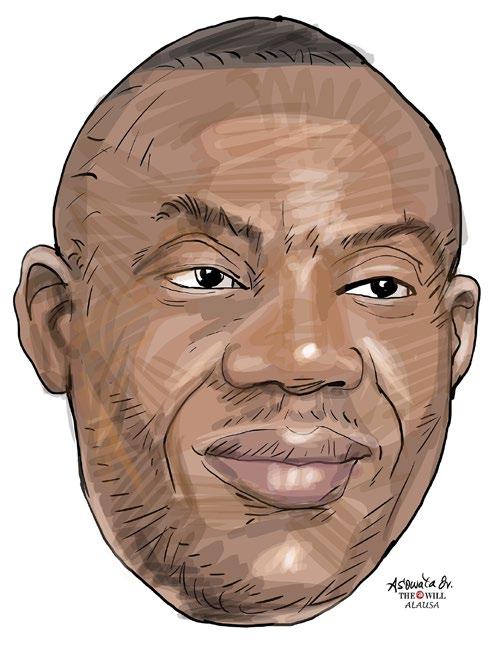
promised to mainstream such payments into the annual budget. There was also mention of N150 billion to support revitalisation of public universities, including infrastructure upgrades. While staff unions acknowledge that the allowances were paid, they say no tangible evidence of the revitalisation funds has reached campuses. Conditions in many institutions remain difficult, with outdated laboratories, weak electricity supply and overcrowded lecture halls hampering teaching and research.
Beyond salaries and funding, the payroll system itself has been a continuing source of friction. The Integrated Personnel and Payroll Information System, used by the government to manage public sector pay, has often produced delays and errors for academic staff. Lecturers complain that cooperative dues and pension deductions have not always been remitted, and that the system undermines university autonomy. ASUU has promoted its alternative platform, the University Transparency and Accountability Solution, and continues to press for its adoption. While officials say reforms are under way, many staff members see little improvement in their day-to-day experience of getting paid.
The impact on students is never far from view. During this week’s protests, some universities postponed examinations and lectures so that staff could take part in the demonstrations. For many students and their families, this raised the fear that another long disruption may be looming. The eight-month closure in 2022 remains fresh in memory and the system has still not fully recovered from the lost academic time. Each stoppage creates further delays in graduation, undermines morale and places public
universities at a disadvantage compared to private institutions that continue to run uninterrupted.
Government officials have responded with assurances that universities remain open and stable, but these messages have not reduced tension. Education Minister, Tunji Alausa has said that a counter-proposal is being prepared and that legal vetting is needed to prevent agreements from collapsing at the implementation stage. From the union’s side, there is little patience left for what it sees as endless delays. Leaders argue that what is required now is a binding document with dates, figures and responsibilities spelled out. Meetings without concrete outcomes, they warn, will only drive lecturers back to the picket lines.
A new initiative put forward by the government is a staff loan scheme designed to support lecturers with access to credit. ASUU has dismissed the proposal, calling it a distraction from the central issues of pay, arrears and funding. Union leaders said loans cannot substitute for fair salaries or solve the underlying problems of underfunding. The rejection shows how strained relations have become, with trust eroded to the point where even welfare schemes are met with suspicion. Lecturers at recent rallies held up placards demanding signed agreements and immediate release of funds rather than debt options.
I believe that breaking the cycle will require more than rhetoric. A workable plan would need to address urgent issues such as withheld salaries and arrears, while also setting a clear schedule for wage award payments and revitalisation funding. Both sides would have to agree to independent monitoring to track progress, with students’ unions and governing councils included so that campus-level needs are represented. Such a plan should be publicly released and legally vetted, to prevent future disputes about what was promised. Only a transparent approach, backed by visible action, can rebuild trust between lecturers and the state.
ASUU also has a role in ensuring clarity and accountability within its ranks. When agreements are reached, communication at branch level will be vital to avoid mixed signals that allow the government to delay. Students, who are the ultimate victims of prolonged disputes, deserve to be part of the process too. Their voices can keep pressure on both sides and remind negotiators that the stakes are not abstract but measured in years of lost time and missed opportunities. For a country seeking to grow its skilled workforce, the risk of leaving a generation stranded in academic limbo is too high.
Political leaders like to say education is a priority. It will only feel that way when lecturers are paid on time and can plan their lives, when laboratories are not museums of old equipment and when students can count on graduating when due. Nigeria cannot grow the skills it needs while its flagship institutions operate in stopstart mode. The window for a fair deal still exists. I implore both sides should treat this week’s event as the last nudge before a full breakdown and deliver a binding, costed agreement that keeps campuses open and gives public universities a fighting chance to do their work.
Political leaders like to say education is a priority. It will only feel that way when lecturers are paid on time and can plan their lives, when laboratories are not museums of old equipment and when students can count on graduating when due